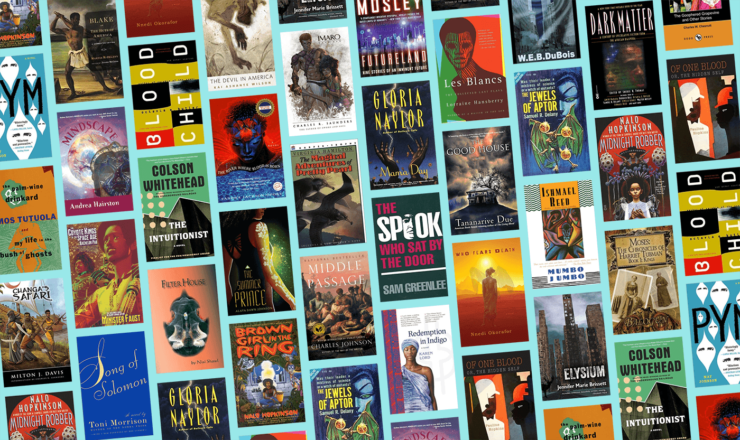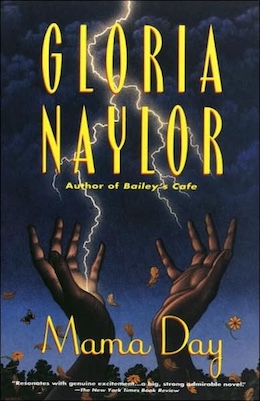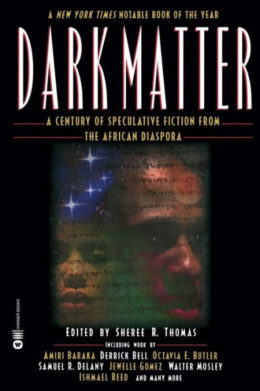In February 2016, Fantastic Stories of the Imagination published author Nisi Shawl’s essay “A Crash Course in the History of Black Science Fiction,” an annotated list of 42 black science fiction works that are important for a readers’ understanding of that continuity and history. (For the most up-to-date version, read Nisi Shawl’s January 2020 update over on the Carl Brandon Society or on her own site).
Since late 2016, Shawl has gone in-depth on the 42 books and stories in the monthly History of Black Science Fiction column here on Tor.com. (With special guest LaShawn M. Wanak popping in when the history reached one of Nisi’s own books!)
Curious? Keep reading! Assembled below are selections from these expanded looks at important titles in the history of Black science fiction. (Note: Some of these books would be considered fantasy, and in many cases throughout the list, the two genres are interwoven.) This walkthrough is current as of March 2020, but the column continues on. Keep track of new installments here.
Mama Day by Gloria Naylor
Apart from the book’s ringingly authentic depiction of the Black fantastic, Mama Day deserves to be deemed essential Black SFF for two more reasons: its ambitious structure, and the permeable boundary it places between science and magic, mirroring the way that for this ethnicity, at least, the distinction between science fiction and fantasy is difficult to draw.
Buy Mama Day From Loyalty Bookstores
“The Goophered Grapevine” by Charles W. Chesnutt
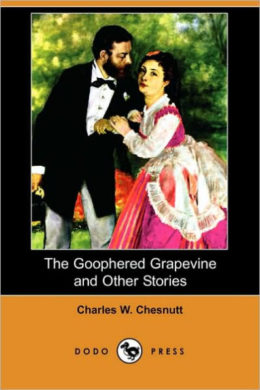
“The Goophered Grapevine” was, as I point out in my original article, the first story by an African American author published in a high-prestige “slick” magazine, making it historically important. Also, it led to a long mentorship between Chesnutt and its publisher, The Atlantic, and it could lead you to read his other works, including his biography of Frederick Douglass and his play, Mrs. Darcy’s Daughter. Several more “Uncle Julius” stories appeared in The Atlantic. They were collected in the 1899 book The Conjure Woman. Another collection of fiction with no fantastic elements, The Wife of His Youth, came out that same year. Chesnutt also wrote novels; the one I’m most impressed by is The Marrow of Tradition, a fictionalized account of the 1898 Wilmington Massacre (aka “race riot”) published just three years later, in 1901. Some of us have dared to read what he dared to write.
Buy The Goophered Grapevine From Loyalty Bookstores
Elysium by Jennifer Marie Brissett
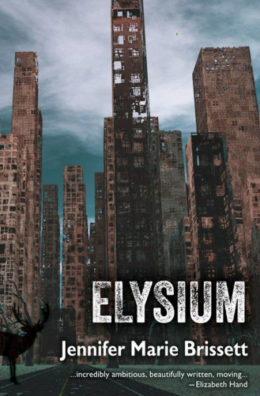
In a series of vignettes separated by ones and zeros and DOS-looking command strings, a protagonist named variously Adrian and Adrianne, of shifting gender and age, loses and finds and loses again the person they love. This loved one, whose name and gender and age also change, is sometimes Adrianne’s brother or father, sometimes Adrian’s pregnant wife or AIDS-stricken husband. And sometimes they’re someone else: Adrian/Adrianne loves Antoinette/Antoine through a multitude of scenarios. These vignettes’ action and dialogue overlap and in part repeat themselves, advancing gradually into grimmer and grimmer territory. Beginning with an accidental injury to Adrianne’s head that seems to occur beneath one of New York City’s ubiquitous scaffoldings, Brissett transports readers from that recuperating woman’s sad apartment, site of her lover’s inexplicable disenchantment with their relationship, to a vast underground city, to the post-apocalyptic ruins of a museum, to other even stranger locales.
Buy Elysium From Loyalty Bookstores
“The Comet” by W.E.B. Du Bois
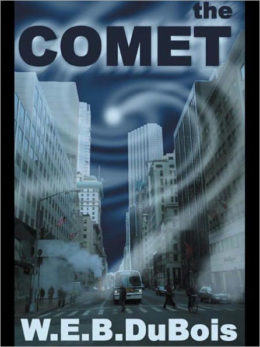
“The Comet” is a prime example of speculative thinking from a man on the forefront of major intellectual developments. A pioneer in the field of sociology and the author of texts foundational to the Montgomery Bus Boycott and other civil rights actions, Du Bois imagined the apocalyptic disruption of daily life as the background necessary for his depiction of true racial equality. Like many Afrodiasporic authors who’ve come after him, he deprivileged the racism inherent in the status quo by smashing that status quo to tragic smithereens. Though the dream of Utopic ages to come is conveyed only in a few paragraphs toward the story’s end and experienced by its characters in a nearly wordless communion, this dream, this communion, is “The Comet’s” crux. That a mind such as Du Bois’ used science fiction as the method to clothe his ideas in lifelikeness stands as a good precedent for those of us who do the same. If only knowledge of that precedent had not been buried and forgotten.
Buy The Comet From Loyalty Bookstores
The Jewels of Aptor by Samuel R. Delany
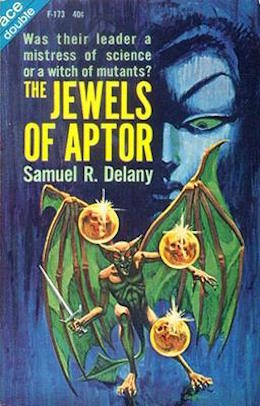
Delany included several subversive elements in Aptor. The most obvious, and the one most attuned to contemporary sensibilities, is its anti-war stance. This is clear not just in the military nature of the “Great Fire,” an atomic conflict that set world culture back some 3000 years (1500 years after its end, the technology is barely medieval); Aptor’s ruins are attributable to similar misuse of its Jewels.
Racial equality is also a key concept in Aptor. Though whiteness is the book’s default setting, the “Negro” Iimmi is no mere sidekick but a full-fledged adventurer. He’s one of only two survivors of a dozen sailors sent on an earlier Aptor expedition, introduced to readers upon the murder of his co-survivor. A lesser (or less invested) author than Delany might have gotten rid of Iimmi rather than the ironically named “Whitey;” instead he joins the heroes on the book’s central quest.
Buy The Jewels of Aptor From Loyalty Bookstores
Les Blancs by Lorraine Hansberry
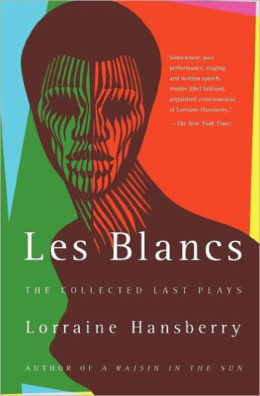
In just the five years between Hansberry’s untimely death and the play’s first public appearance, the pan-African political situation she referenced shifted: battles and legislative drives were won and lost, additional assassinations committed. Things have changed even more radically since. A work in progress that traveled with Hansberry on trips to the hospital towards the end of her life, Les Blancs could well have continued being reshaped to reflect emerging reality. It could also, like China Miéville’s Iron Council, have employed the techniques of imaginative fiction to show the future’s ineffableness. If Hansberry had lived.
Buy Les Blancs From Loyalty Bookstores
The Magical Adventures of Pretty Pearl by Virginia Hamilton
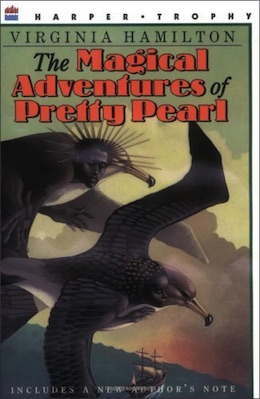
Fantastical literature written for children often lures its readers on to look for its adult equivalent. And seeing ourselves early on in the way Hamilton portrays black people—as magical beings at the centers of stories—trains us to expect to find ourselves in the speculative worlds and imagined futures we encounter later in life, performing miracles, saving the universe, living happily forever after. Pretty Pearl and other Afrodiasporic Middle Years and YA fantasy, SF, horror and so forth create an expectation in their audience that there’s going to be more. Which is extremely important work. That expectation gets us hungry for more of these kinds of tales, hunting for them, ready to write them ourselves if our hunt comes up empty-handed or we run out.
Buy The Magical Adventures of Pretty Pearl From Loyalty Bookstores
The Spook Who Sat by the Door, by Sam Greenlee
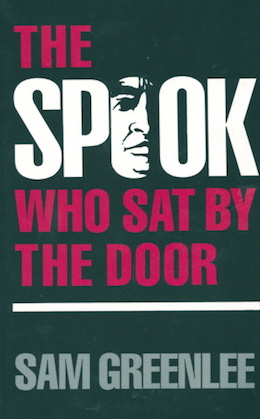
The day Greenlee sought to seize via his novel’s call to action has passed. So Spook is no longer science fiction, and though I treasure my tight-spined mass market paperback for multiple reasons—it’s inscribed and signed by the author, it contains one of my favorite ironic lines of all time (“In all his career as a professional Negro, Summerfield had never before encountered a white liberal who actually wanted an original opinion from a Negro concerning civil rights, for they all considered themselves experts on the subject.”)—it’s much more than an artifact of an historical moment. More than just a story of what could have happened. Because it’s that, true. But also, if you look at the making and preservation of the 1973 movie of the same name, it’s an example of how to go forward from where we find ourselves now.
Buy The Spook Who Sat by the Door From Loyalty Bookstores
Futureland by Walter Mosley
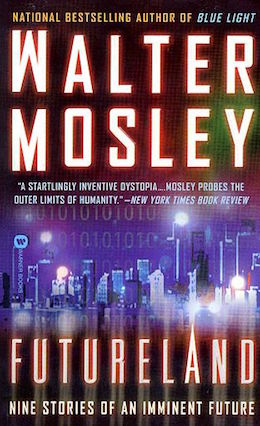
Though their plots are self-contained, together these nine pieces describe a dystopia in which wealthy corporations and individuals control the majority of the world’s population via money, drugs, and repressive laws. Read them in the order of the book’s Table of Contents and you’ll be shown how profit-centered misery can be confronted and demolished using love and x-rays. Time has a long narrative arc that soars implacably high above the lesser arcs of human lives, periodically plunging down to anchor itself in their decision points. This history of the future both focuses on the personal and ranges far beyond its limited concerns, and Mosley’s structural choice of linked short stories highlights the dual nature of his SF vision.
Buy Futureland From Loyalty Bookstores
Mumbo Jumbo by Ishmael Reed
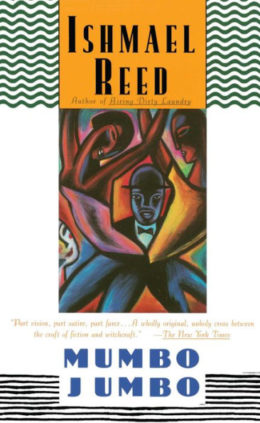
Mumbo Jumbo was finished, per the note Reed made at its end, at 3:00 p.m. on January 31, 1971, and published in 1972. I was 16 years old. Much of what’s now labeled “the 60s” was actually the early 1970s. I am here to tell you that in “the 60s” we believed we were about to save the world. Yes, my mother told me that was a naïve attitude. In vain. Books like this one convinced me and my peers we were in the throes of a new Jes Grew manifestation: the Funky, Downhome Dawning of the Age of Aquarius—and if its original liturgical text had been lost perhaps, as Reed hinted, we could write a new one!
Or perhaps Mumbo Jumbo was it. Reed had already wowed readers with The Freelance Pallbearers in 1967 and Yellow Back Radio Broke-Down (a “hoodoo Western”) in 1969. This latest might be his greatest, and who was to say his greatest couldn’t help us willing Jes Grew Converts re-enchant the world?
Who’s to say it didn’t?
Buy Mumbo Jumbo From Loyalty Bookstores
Hope and Vengeance in Post-Apocalyptic Sudan: Who Fears Death by Nnedi Okorafor
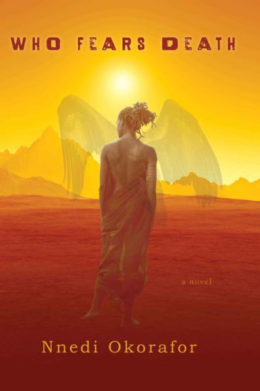
Once again we confront the question of genre purity. Are you beginning to sense a common theme arising from these essays’ topics? Many works cited in my history of black science fiction defy classification as SF or fantasy. Who Fears Death often gets described as “science fantasy,” a hybrid term, because though indisputably taking place in a technological future, it features shapeshifters and diviners among its water distilling machines and pocket video cams. Such boundary enforcement annoys me; when I am myself asked why I included similar instances of magic in my otherwise scientifically rigorous novel Everfair, I often respond by wondering aloud why I included descriptions of weather or cooking. Those who automatically deny magic’s reality position themselves as superior in understanding to indigenous peoples’ ways of knowing the world. That’s an untenable position to take when you’re writing from the viewpoint of said indigenes.
Buy Who Fears Death From Loyalty Bookstores
Old and Cold: “The Space Traders” by Derrick Bell
“The Space Traders” was first published in 1992. Though not hailed as a post-racial period with the same verve as the eight years of the Obama administration were, this era was supposedly an enlightened one. The legal triumphs of the Civil Rights Movement looked like they were here to stay. Lynching had taken what seemed to be a permanent vacation. Given this generally positive milieu, why would Professor Bell imagine such a negative outcome for his story’s conflict?
Back in the late 60s and early 70s, when I was flower-power-digging hippie, my mother, at the unimaginably ancient age of 37, told me that long-lived experience gives you a different perspective on history. She explained that over decades you discern patterns, arcs, swinging pendulums of behavior, values, and social tendencies.
In 1992, Bell was 62. My age now, as I write this.
And now, as I write this, the conclusion of “Space Traders” seems all too likely.
Buy The Space Traders From Loyalty Bookstores
Divine Effort: Redemption in Indigo by Karen Lord
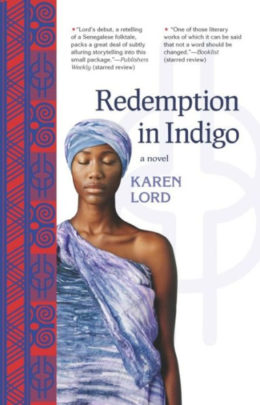
Like Paama, Lord’s wise-blooded and well-practiced touch elevates a craft to an art. Food is made of more than ingredients, and stories are made of more than words. By focusing on a woman remarkable only for entirely female-identified skills and attitudes—cooking, kindness, patience—and by choosing for her book’s setting a non-exoticized Senegal complete with cities and bars and crops and pastures as well as plagues, jungles, and buried treasure, Lord offers us something vastly unlike the usual cliché-ridden accounts of mortals chosen to exercise enormous power. Redemption in Indigo mentally refreshes readers jaded by Joseph Campbell’s notorious monomyth. The characters of Paama, Ansige, and the indigo-skinned djombi, whose redemption provides the book’s title, help us to enjoy all marginal people’s quests and adventures, in the same way that learning to appreciate one dish from an unfamiliar cuisine helps us to appreciate many others.
Buy Redemption in Indigo From Loyalty Bookstores
Sense from Senselessness: “The Devil in America” by Kai Ashante Wilson
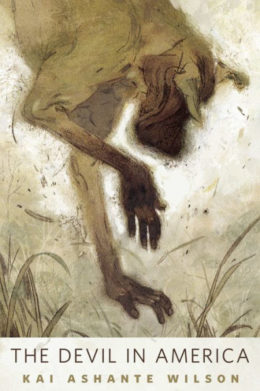
Writing that moves me deeply usually falls into one of two categories. Either it’s something I would never have thought of doing, or it’s something I’ve thought of doing but never dared. “Devil” is one of the latter sort. Could I have ever brought to vivid life one of those hellish scenes of mass murder so often repeated they’ve become a race memory? No. Not for any money. Not for any reward of any sort.
But Wilson did. And beautifully. Come marvel with me at what he’s done.
Read The Devil in America on Tor.com
Uses of Enchantment: The Good House by Tananarive Due
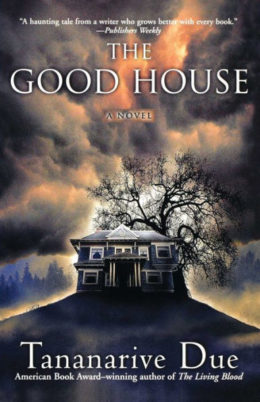
For centuries now, much of the horror genre has operated as a purveyor of Christian propaganda. That’s only my opinion, of course—and bear in mind that I’m no Christian. I practice Ifa, a West African tradition closely related to the New Orleanian Vodun of Marie Toussaint. Having repeatedly seen my religion vilified and equated with devil worship (as in the infamous film Angel Heart), I breathed several long sighs of relief upon finding The Good House free of such spuriousness.
Buy The Good House From Loyalty Bookstores
Kings and Judges: Moses: The Chronicles of Harriet Tubman by Balogun Ojetade
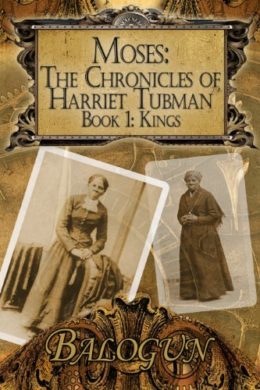
Despite the dauntingly long title, Moses is no interminable historical treatise. It’s a fast-paced adventure, and at 174 pages, a nicely compact paperback with the weight and feel of a fat-spined graphic novel. Ojetade begins the book with heroine Harriet’s single-handed raid on a den of slavers and child abusers, and she barely rests between her numerous other exploits. Battling a body-swapping demon, pursued by an armed battalion of animated mounds of earth, Harriet relies on the “Lawd” to ensure her victory in each new episode she engages in, and counts on her superior, extra-quick healing abilities to prepare her afterwards for the next battle. Like Jesus Christ himself driving moneylenders from the temple precincts, she lays about her with a fierceness born of faith. The author’s experience as a martial arts instructor helps him craft the book’s fight scenes with enviable crispness and clarity: “The web of flesh between Harriet’s thumb and forefinger struck the man’s throat,” he writes at one point. Swift moves follow, step by rapid step: throws and punches and head butts in logical and devastating order. And because feisty Harriet is so easy to root for, outcomes matter, and the story’s frequent bouts of violence never feel gratuitous. She’s fighting evil. We’re on her team.
Find Moses: The Chronicles of Harriet Tubman On Amazon
Mightier than the Gun: Midnight Robber by Nalo Hopkinson
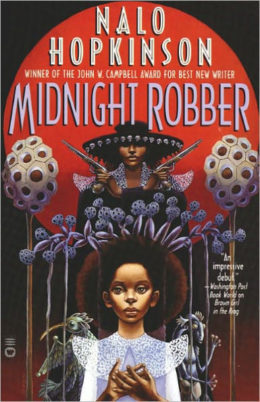
Hopkinson accomplishes so many wonders with this novel that it’s worth taking time to enumerate them. First, in case you missed what I said earlier, I’ll mention again the sheer beauty of Hopkinson’s prose. Combining the dancing polyrhythms of a panoply of Caribbean vernaculars with thoughtfully interpolated standard English, her dialogue and her vivid descriptions of character, settings, and action move, groove, charm, and chime together in deepest harmony. The story is sometimes funny, sometimes tense, sometimes tragic, and always utterly involving. My favorite passage in Midnight Robber is when Tan-Tan, tired of the live food and alien housekeeping protocols of a douen village, snarks at her reluctant hosts: “Oonuh keeping well this fine hot day? The maggots growing good in the shit? Eh? It have plenty lizards climbing in your food? Good. I glad.”
Second, Hopkinson depicts the presence of African-descended founders of interstellar colonies as a given. Axiomatic. No need for discussion or speculation as to how that could occur. It simply does.
Buy Midnight Robber From Loyalty Bookstores
What Men Have Put Asunder: Of One Blood by Pauline Hopkins
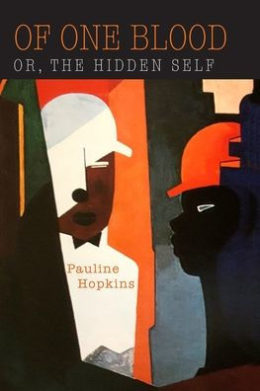
Over the winter of 1902 to 1903, The Colored American Magazine (which Hopkins edited) published chapters of a work blending two popular late-Victorian literary forms: “society” novels of the doings of the upper classes and lost world adventures. Though really a “problem” book, Of One Blood begins more or less in the style of the first. A Boston medical student falls in love with the (white-appearing) soloist of a touring (“colored”) choir, proposes marriage, and is accepted—but the machinations of a rich rival drive him from his wife’s arms to take part in an Ethiopian archaeological expedition.
Here the Lost World narrative takes over. Hopkins’s hero, Reuel Briggs, himself hiding his own African heritage, discovers a hidden kingdom protected by two merging streams, of which he turns out to be the prodigal king. Unlike the countries discovered in H. Rider Haggard’s famous genre exemplars She and King Solomon’s Mines, though, or dozens of other authors’ similar stories, the inhabitants of this secret land are black. Not only black, but proud proclaimers of blacks’ incomparable historical significance.
Buy Of One Blood From Loyalty Bookstores
Feminism, Race, and Relationships in Filter House by Nisi Shawl, Discussed by LaShawn M. Wanak
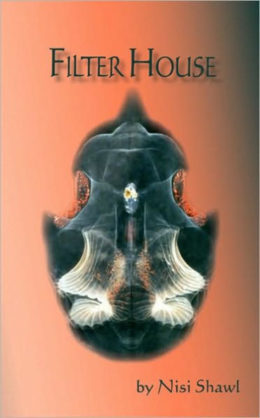
One of the most gorgeous and creepy stories is “The Raineses’.” On the surface it’s about a young girl, Anniette, spending her summer with her grandmother at an old house that was part of the Underground Railroad. Here, Shawl’s prose is a delight to read as Anniette explores the house’s different rooms. She comes across ghosts who comment on her presence with casual racism, but also lead her to secrets about her own legacy. Unfortunately, Anniette is too young to understand the ramifications of those secrets.
Shawl’s stories do not seek to answer questions or draw conclusions. They only invite us into these women’s lives, complex as they are.
Buy Filter House From Loyalty Bookstores
The Droids You’re Looking For: The Coyote Kings of the Space-Age Bachelor Pad by Minister Faust—August 1, 2018
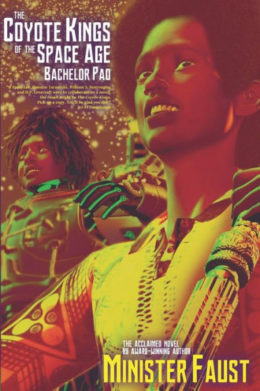
Though Faust later won the Carl Brandon Society’s Kindred Award for his second novel, From the Notebooks of Dr. Brain (reprinted as Shrinking the Heroes), his debut novel is also quite noteworthy, both for its ambition and for its Afrocentric focus (predating the stupendously successful movie Black Panther’s depiction of Wakanda by years). The book’s narrative structure, also, is far from simple: the story is told from eleven first-person viewpoints. And these eleven voices are unmistakably individual. Two heroes and eight villains recount the convergence of an earthquake, a drug crisis, and a global plot to transform humanity into a giant pain farm. The final point of view describing these goings on belongs to a mysterious woman named Sheremnefer, lone survivor of a priestly cult sworn to protect the skull of Osiris from power-mad malefactors.
Buy The Coyote Kings of the Space-Age Bachelor Pad From Loyalty Bookstores
Why Men Get Pregnant: “Bloodchild” by Octavia E. Butler—September 6, 2018
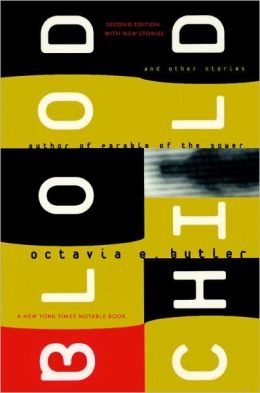
The pressure to classify this story as an allegory of slavery comes on multiple fronts. That Butler resisted doing so shows how stubborn she could be when it came to sticking to her aesthetic principles. Framing the proposition as either/or, though, is a failure of understanding. People can claim multiple identities and multiple oppressions, and these often inform our creative work. Butler was black and a woman and tall and shy and nearsighted and a vegetarian and an atheist and a high blood pressure patient. Three of these identities divided her from this culture’s default settings in ways the culture calls important: race, gender, and religion. Viewing “Bloodchildren” through at least two identity lenses—race and gender—produces binocular vision. Depth. Room to wander around in the world the author made.
Buy Bloodchild From Loyalty Bookstores
What God and Man Hath Wrought: Blake; or, The Huts of America by Martin R. Delany
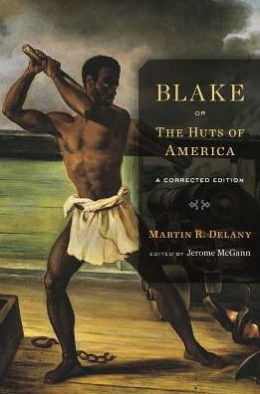
Blake was published serially in two different magazines beginning in January, 1859. Though the most complete edition available is 74 chapters long, the novel is unfinished. Six more chapters were intended—they may even have been written. But in April, 1862, “LXXIV American Tyranny—Oppression of the Negroes,” was the last to appear.
Soon after that the Civil War broke out, and Delany’s vision of a black-led slave rebellion whose result is lasting freedom became alternate history rather than a daring prediction. But we who read the collected chapters in the spirit in which Delany wrote them recognize his stubborn genius: He refused to let the status quo’s claim on reality stand unchallenged. Just like today’s progressive nerds.
Buy Blake; or, The Huts of America From Loyalty Bookstores
Unchained Harmonies: The River Where Blood Is Born by Sandra Jackson-Opoku
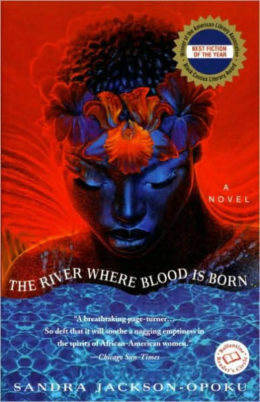
In the multi-voiced, rainbow-hued literary kente cloth of her novel, Jackson-Opoku recreates the diversity of African-derived culture, a whole which has never been a monolith. To start with, Africa is a continent, not a country: Languages, landscapes, and histories vary from one nation to another. To go on, some left. Some stayed. Add to those fundamental distinctions others along other axes: age, gender, sexuality, disability… no wonder there’s no single, totalizing “African experience” for an author to represent. Instead, River shows us how our differences give rise to beautiful harmonies and enrapturing syncopation.
Buy The River Where Blood Is Born From Loyalty Bookstores
Revising the Legacies of the Past: Middle Passage by Charles Johnson
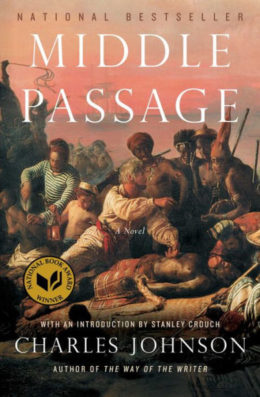
It’s this willful revising of the past’s legacies that makes Middle Passage so thoroughly science-fictional. Though the novel is set in the early Victorian era, Johnson avoids imbuing his characters with stereotypical traits of that period. Questioning the status quo via how he writes as much as what he writes, Calhoun represents the unrepresentable, the unusual, the uniquely authentic experience of blerdliness (aka black nerdliness), that essence of Afro-diasporan cool. By the book’s end Calhoun realizes he can form his own conclusions based on what’s really happening. He pays attention to actual events. He abandons prepared scripts. Speculation thrives on open-eyed observation, and Middle Passage teaches both characters and readers how to clear their minds of all impediments and consider all a life story’s possibilities. It’s a kind of primary course for dreamers, one in which the customary syllabus of historical outrages gives way to an experimental one featuring meditation and the audacity of hope.
Buy Middle Passage From Loyalty Bookstores
Building Love, and the Future We Deserve: The Summer Prince by Alaya Dawn Johnson
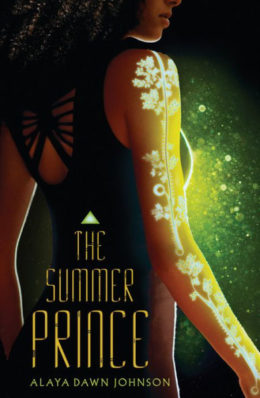
Palmares Tres, the setting for most of The Summer Prince, is a sort of pyramidal arcology, an ostensibly Utopian Brazilian city built by survivors of a combined global medical, military, and climatic apocalypse. Hundreds of years back in its past (which is our future), the city’s founders instituted a ritual kingship supporting women’s rule. Remarkably, the city and its political system have sustained themselves. And though Palmares is stratified and divided, from the Queen’s Residence at its peak to the slums surrounding the algae vats at its base, its citizens are fiercely loyal to its spirit. They always manage to come together to choose their sacrificial king.
Buy The Summer Prince From Loyalty Bookstores
Beyond Boundaries: My Life in the Bush of Ghosts by Amos Tutuola
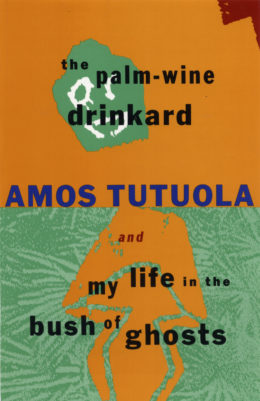
Wandering in the bush from ghost town to ghost town, our hero is magically transformed into a cow; into a votive statue covered in blood; into a sticky, web-wrapped feast for giant spiders. During his decades-long visit he gets married twice; he also trains and works as a magistrate. Alongside references to events happening at familiar hours—8 a.m., 11 at night—Tutuola mentions the hero’s fifteen-year sojourn with a king ghost and similarly impossible stretches of time.
Buy My Life in the Bush of Gods From Loyalty Bookstores
Studying the White Man: Pym by Mat Johnson
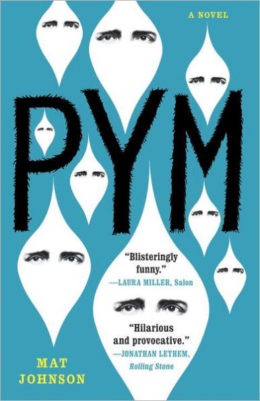
Johnson’s Antarctica is a busy place. In addition to Tekelians (the polite name for snow honkies) inhabiting secret under-ice caverns, there’s the climate-controlled dome where famous painter Thomas Karvel hides out. Karvel is a very thinly disguised Thomas Kinkade, and his oversaturated, multihued color schemes represent a different kind of whiteness: the cultural kind. Like Poe, Karvel/Kinkade idealizes the sort of Caucasoid purity which never could have existed: removed from the global history of inventiveness, independent of international trade and labor.
There’s yet another form of whiteness to be found in the cartons of Little Debbie Snack Cakes imported by Jaynes’s childhood friend Garth Frierson. The most soulless of foods, the empty essence of consumer goods, addictive and void of all nutritional value, Little Debbies come to play a pivotal role in the black/Tekelian economy.
Buy Pym From Loyalty Bookstores
The People Could Fly: Song of Solomon by Toni Morrison
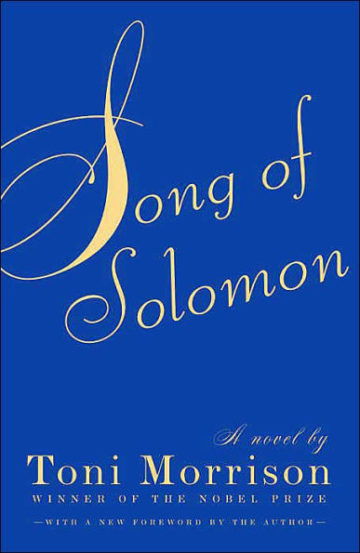
Like the intricate weave of the supporting cables of a suspension bridge, this novel’s plot threads tug into place a story taking readers from one point to a similar yet distant other. From the doomed flight of the silk-winged insurance salesman on the day of Milkman’s birth to his own heroic leap onto the wind’s back, we traverse the ad hoc mundanities and new-minted traditions of black lives improvising themselves into existence. Such familiar surroundings for anyone who has lived in an Afrodiasporic community… Out of these inventions and muddled, half-remembered dreams we spin our webs of culture.
Buy Song of Solomon From Loyalty Bookstores
Been Down So Long It Looks Like Up: The Intuitionist by Colson Whitehead
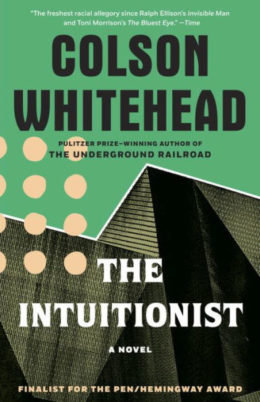
Debate as to whether to label The Intuitionist science fiction is as prevalent as with many another title covered in this series. The closest match in terms of speculative fiction subgenres is alternate history, and that’s how I generally think of it. Diagnostic genies may or may not be part of the novel’s reality, but that reality itself is strangely out of true with our own—at least in some points.
Whitehead’s genius—evident even this early in his career—lies in making metaphor do double duty. As critics have noted, SF often contains literalized figures of speech. Authors have to watch what they say and avoid the confusing use of lots of common idioms, since these could be literally true; a character’s eyes, for instance, may actually be able to fall physically to the floor without coming to harm. In The Intuitionist, as in The Underground Railroad, the power dynamics of racial inequality are metaphorized—in the first book as elevator equipment, in the second as a subterranean transportation system.
Buy The Intuitionist From Loyalty Bookstores
Another Part of Me: Mindscape by Andrea Hairston
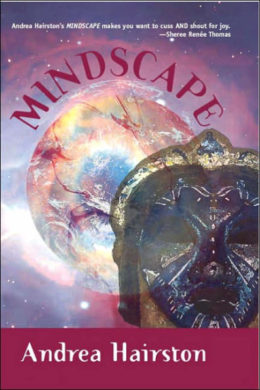
Set in a post-apocalyptic future in which lethal Barriers have mysteriously sprung up to divide Earth into isolated regions, Mindscape follows the fates of characters representing different tribes who’ve come into existence after generations of this mess. There’s Lawanda, an “ethnic throwback” preserving the aesthetics and values of 20th-century African American culture; Ray, a film hero drawing on his studio experience to live out a real-life thrilling adventure; and Elleni, a Barriers-generated mutant with semi-autonomous dreadlocks. There are several others as well, including—depicted in flashbacks—Celestina, author of an inter-region treaty now ostensibly up for ratification.
Buy Mindscape From Loyalty Bookstores
It’s No Game: Brown Girl in the Ring by Nalo Hopkinson
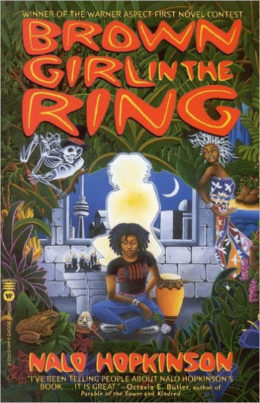
With this novel, in many ways, Ti-Jeanne’s creator Hopkinson also cleaves to tradition while simultaneously striking out on her own. Her father, Abdur Rahman Slade Hopkinson, was a writer too. But a poet—so though in some sense following in her father’s footsteps, Hopkinson focuses her talents in a different direction, on a slightly different task: that of telling a story. A science fiction story.
Of course, science fiction has its traditions as well. Some of these Hopkinson honors by her adherence to them, as when she sets Brown Girl in the future and posits plausible advances in technology. And some she honors by flipping or ignoring them, as with the racial makeup of her cast of characters and the tangible presence of her fictional world’s spiritual dimension.
Buy Brown Girl in the Ring From Loyalty Bookstores
With a Mighty Bound: Imaro by Charles Saunders
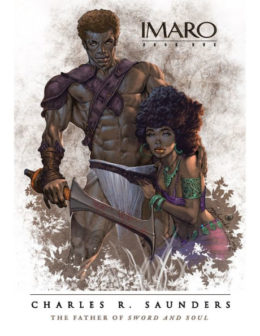
When I was little, I secretly adored Edgar Rice Burroughs’s Tarzan. If only I’d had these books to read instead! Charged with the challenge of adventure! Free of racial bigotry! And most important, filled with the angst of the loner—the loner I was then, the loner we all are at that young age. As Imaro grows to manhood in his series’ first volume, seeking approval, planning his stupendous feats of strength and bravery, he encounters cruel social superiors, unscrupulous sorcerers whose powers render them traitors to humanity, and other foes he fails to anticipate, driven by forces he has no way to control. Imaro is undoubtedly a man—just ask Tanisha, his beautiful, loving, yet fiercely lethal companion through much of his journey. He’s a man, but a man who appeals to the child in us all: the eternal wonderer, forever facing new trials, always asking himself if he’s ready for an unknowable future in the constant unfolding of previously undiscovered terrain.
Buy Imaro From Loyalty Bookstores
Modern Middle Ages: Changa’s Safari by Milton J. Davis
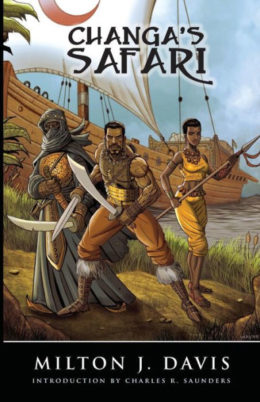
Changa Diop first appears to readers at the helm of his dhow Sendibada, a merchant vessel leading his fleet of nine wealth-laden ships to his newly chosen base of operations. Sleek, fast, armed with cannon, and crewed with highly trained sea-going fighters called bahari, Changa’s dhows sail south over the Indian Ocean from Mombasa, Kenya to Sofala in present-day Mozambique. Along with Changa we meet his companions: the Tuareg, a robed and veiled warrior vowed to silence, and Panya, a beautiful Yoruba healer. A chance encounter with a fugitive prince named Zakee ibn Basheer sends them on an unplanned quest for an evil talisman, the infamous Jade Obelisk, whose use by an unscrupulous sorceress threatens their world’s very existence. Changa and his comrades manage to defeat the sorceress, even fending off actual deities, only to embark on yet another adventure: a voyage halfway around the world to the home of their new allies, a visiting embassy of Chinese.
Buy Changa’s Safari From Loyalty Bookstores










